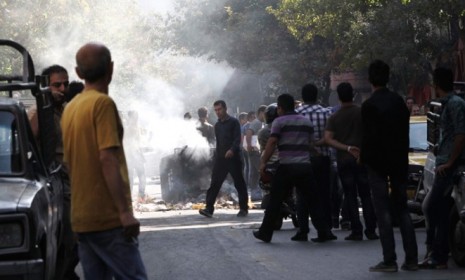Iran's currency meltdown: How badly will it weaken the regime?
Clashes break out on the streets of Tehran over the country's economic tailspin, and some wonder whether Iran's leaders can maintain control

The issue: Iranian riot police on Wednesday launched a crackdown on black-market currency-trading in Tehran, setting off clashes with money-changers and sparking at least one protest against the government's economic stewardship. The violence followed a precipitous decline in Iran's currency, the rial, whose value dropped 40 percent over the past week alone. Analysts attributed the drop to tough economic sanctions imposed by the U.S. and Europe against Iranian oil, which is the country's largest source of revenue by far. Things have gotten so bad that President Mahmoud Ahmadinejad even went on television earlier this week to publicly beg his countrymen not to trade their rials for other currencies. The sanctions are meant to deter Iran from making progress on its suspected nuclear weapons program, and the Obama administration has urged Israel to give the sanctions time to take effect before taking any military action against the Iranian regime.
The reaction: Some see Iran's economic problems and the resulting unrest as an indication that the Iranian government is in danger of falling. "This is a regime on the edge," says Andrew Sullivan at The Daily Beast. Indeed, there is evidence that Iranians blame the government for failing to protect the rial, suggesting that it's at least possible that widespread protests against the regime could break out as they did in 2009. However, there is always the possibility that the government — which is really run by a cabal of clerics — could place all the blame on Ahmadinejad. The clerics "have grown increasingly disenchanted with his leadership over the past 18 months and may be looking for a convenient scapegoat," says Scott Neuman at NPR. And don't forget that economic suffering doesn't necessarily cause pariah regimes to change their ways, let alone usher in a revolution. "Other economies have withstood harsher economic pressures in the past and there is no shortage of regimes under sanctions which have survived without changing their course — North Korea, Zimbabwe, and Cuba, to name but a few," says Hassan Hakimian at Britain's The Guardian.
Sources: The Christian Science Monitor, The Daily Beast, The Guardian, The New York Times, NPR
The Week
Escape your echo chamber. Get the facts behind the news, plus analysis from multiple perspectives.

Sign up for The Week's Free Newsletters
From our morning news briefing to a weekly Good News Newsletter, get the best of The Week delivered directly to your inbox.
From our morning news briefing to a weekly Good News Newsletter, get the best of The Week delivered directly to your inbox.
A free daily email with the biggest news stories of the day – and the best features from TheWeek.com
-
 The launch of the world’s first weight-loss pill
The launch of the world’s first weight-loss pillSpeed Read Novo Nordisk and Eli Lilly have been racing to release the first GLP-1 pill
-
 Maduro’s capture: two hours that shook the world
Maduro’s capture: two hours that shook the worldTalking Point Evoking memories of the US assault on Panama in 1989, the manoeuvre is being described as the fastest regime change in history
-
 Six sensational hotels to discover in 2026
Six sensational hotels to discover in 2026The Week Recommends From a rainforest lodge to a fashionable address in Manhattan – here are six hotels that travel journalists recommend for this year